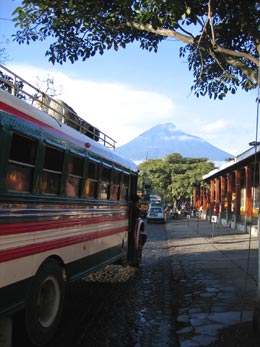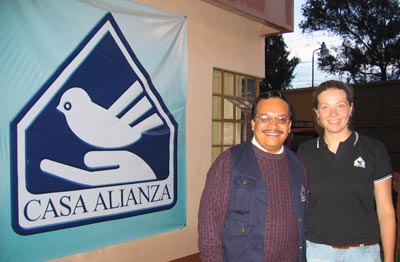Asociacion Casa Alianza (Ciudad de Guatemala, Guatemala)

Camioneta (chicken bus) and Volcan Agua, La Antigua Guatemala |
I am volunteering with Casa Alianza's Legal Program in Guatemala City. The organization's mandate is to protect, defend and enforce children's rights. They run three residence facilities (one for boys, one for girls and one for young mothers) to provide support to minors who call the city streets their home, come from broken families, are recovering from a substance dependency, have children or have been maltreated or sexually abused.
I'm researching the topic of Commercial Sexual Exploitation by studying specifically what the organization has done to address the issue. Although I have learned a great deal about the subject (mainly from reading rather depressing studies on the staggering levels of corruption, abuse and impunity in the country), three months is not enough time to feel that I am fully contributing to the organization. (Although teaching the Assistant the Ctrl + F Word search function to help her locate a child's name in a 15-page list of residents' names has greatly simplified her life.)
Working in Spanish has been both demanding and gratifying as I've had to familiarize myself with specific legal terms as well as the street slang used by the kids in the residences. However, the biggest challenge has been adjusting to the different work environment and mentality. Coming from former government jobs where I didn't have to think twice about raiding the office supply cabinet or printing off large documents, it's quite a change to have to take your own paper to the prehistoric photocopier and keep track of your assigned pen. All part of the experience of volunteering with an NGO where the dominating theme is money - and lack thereof. The Legal team is unbelievably busy and I don't always feel directly implicated or involved. It has made for some rather long work days.
The few drawbacks aside, I have had the opportunity to interact and work with a group of dedicated and exceptional people, as well as live several experiences that have made my time here worthwhile and unforgettable.
One of the highlights was taking part in one of Casa Alianza's interventions (operativos). The organization regularly collaborates with officials from Immigration, the National Police and the Office of Crimes Against Women, to raid bars, dance halls and massage parlours looking for minors who are being sexually exploited. Such interventions often result in Immigration rounding up illegal workers from neighbouring Central American countries (with more than one reported case of no minors being located on site once the owner of the establishment was tipped off by a government official). The June 16 outing however resulted in bringing three minors into our custody: two 14 year olds (including one Honduran) and one 17 year old. What's most frustrating is that, under the current law, the bar owners get off by simply paying a minimal fine (equivalent to US$150). An amount quickly reimbursed by overworking the remaining female employees. So if my time here has taught me anything from a legal aspect it's that written laws are one thing, enforcement (and more importantly lack thereof) is a whole other topic.
My time here in Guatemala has not been exclusively "law" related. The country may be small in size but its landscape is varied and its indigenous culture rich. From black sand beaches, to hiking active volcanoes, to trekking through lush jungle and scrambling up Mayan ruins, I've covered off most of the guidebook highlights. I'm living in the neighbouring colonial UNESCO town of La Antigua. The 40-min commute on a chicken bus is a daily life-insurance gamble but worth it to be living in a safer, livelier town rather than in the country's capital famed for being the most violent and dangerous in the region.
Laura Hage with a colleague at the Casa Alianza Legal Program



